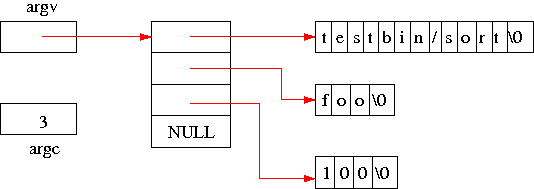A related constraint is that the stack pointer should always start at an address that is 8-byte aligned (evenly divisible by 8). This is because the largest data types that require alignment (and which might be pushed onto a stack) are 8 bytes long, e.g., a double-precision floating point value.
int
main(int argc, char **argv)
{
int file;
if (argc < 3) {
errx(1, "Usage: tail ");
}
file = open(argv[1], O_RDONLY);
if (file < 0) {
err(1, "%s", argv[1]);
}
tail(file, atoi(argv[2]), argv[1]);
close(file);
return 0;
}
argv is a character pointer pointer - it points to an
array of character pointers, each of which points to one of the
arguments. For example, if the tail program is
invoked from the kernel command line like this:
OS/161 kernel [? for menu]: p testbin/sort foo 100Then the argv and argc variables should be set up as illustrated in the following illustration:

A detailed description of the expected set up of argv and argc can be found in the man page for the execv system call.